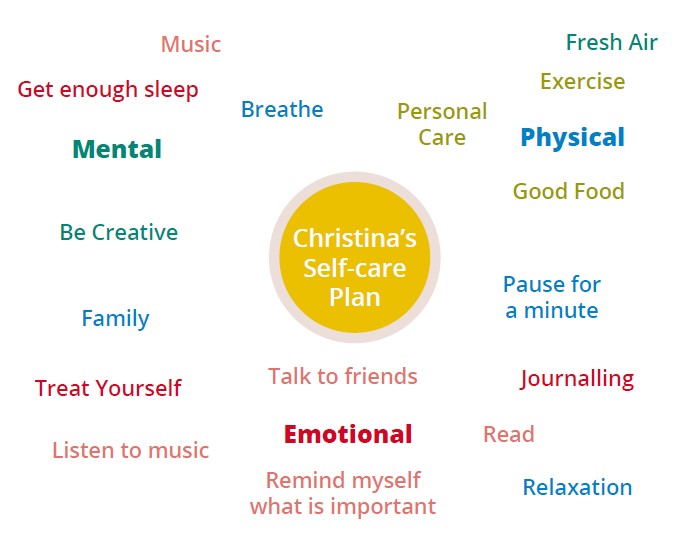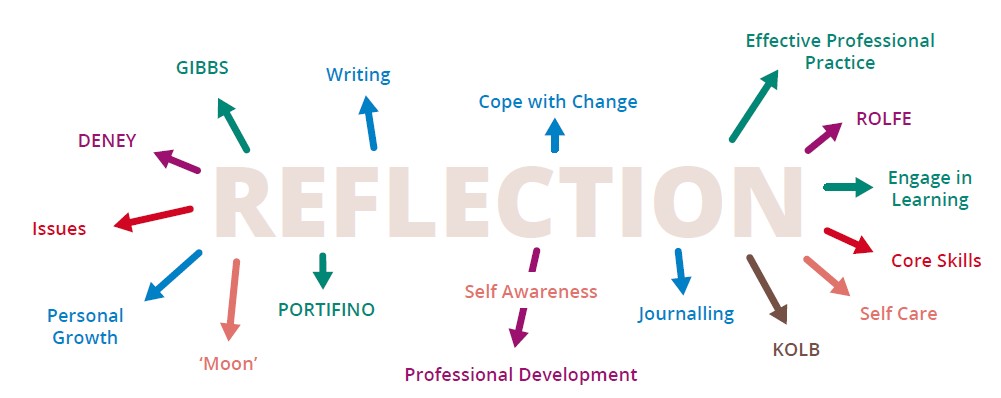Chapter 80 – Christina Sieber (D5SOP19)
Domain 5 Standard of Proficiency 19
Demonstrate an understanding of the importance of one’s own personal growth and development in order to engage in effective professional practice whilst developing the personal skills of self-care and self-awareness in the role.
|
KEY TERMS Personal growth and development Self-awareness Self-care Reflective practice Reflective writing/ journalling
|
Social care is … about relationship developing, building, nurturing, self-care, awareness and reflection. It is impossible to care for others if you do not care for yourself. |
TASK 1
Reflecting on Practice
As a social care worker (or a student in training), think of a time you supported another person to make a decision that involved an element of risk. How did you weigh up the benefits versus the risk? How did you support that person?
The Importance of Personal Growth and Development
An understanding and engagement in personal growth and development is an essential tool in the training of social care workers and in the practice of social care work. The use of self-care, self- awareness and reflection can help a social care worker engage in effective professional practice and explore aspects of themselves that may make them vulnerable. Using these tools in supervision can help to guide a supervisor and supervisee through difficult events and situations.
What is Self-awareness?
Awareness is about what you notice in life and in the world. It involves paying attention to what is happening around you. Forms of awareness are different for everyone and there is no right or wrong way of being aware. It is about how you experience life. So, if awareness is about noticing what is going on in the world, self-awareness is about focusing what you notice and your awareness of yourself.
While there is no correct or incorrect way to be self-aware it is important to be able to focus on your feelings, your reactions, your behaviours and your thoughts. One way of becoming self-aware is to practise self-care.
What is Self-care?

Self-care is something you give yourself. It is any task that helps our mental, physical, and emotional health. Taking care of our wellbeing through self-awareness and self-care is a vital component in engaging in personal growth and development as a social care student or social care worker. There are many tools that can aid in this task. One way of becoming self-aware is to have a self-care plan. Constructing a self-care plan when times are good can help to focus you when life and/or work gets hard and you need a reminder of how to get back on track.
TASK 2
How do you self-care? What self-care techniques work for you?
Write down a couple of ways in which you engage in self-care in your life. Use these to create a self-care plan to look after yourself.
Another way of engaging in self-care and effective professional practice is to become reflective and to keep a reflective journal. This should be encouraged throughout social care training and when in practice.
Reflective Practice
Reflection can be defined as how a person perceives an experience, thinks and reflects on that experience and then uses their reflection to learn from that experience (Kolb 1984). It is the learning gained that is important. ‘Wellbeing’ is a term used frequently when discussing people’s mental health; similarly, the term ‘reflection’ is important when talking about well-being in personal and professional life.
Dewey, quoted in Carlile and Jordan (2007: 27) suggested that reflection can be defined as ‘turning a subject over in the mind and giving it serious and consecutive consideration’. Kolb (1984: 38) spoke of learning being ‘the process whereby knowledge is created through the transformation of experience’. Gibbs (1988) added that it is not enough to have an experience; the important part is the process of thinking about it, and this new learning shapes how we react to similar situations.
Moon (2004: 82) defined reflection as:
A form of mental processing – like a form of thinking – that we may use to fulfil a purpose or to achieve some anticipated outcome or we may simply ‘be reflective’ and then the outcome can be unexpected. Reflection is applied to relatively complicated, ill-structured ideas for which there is not an obvious solution and is largely based on the further processing of knowledge and understanding that we already possess.
Reflective Writing/Journalling
The act of reflective writing/journalling can provide individuals with the opportunity to make meaning of their past experiences. They can then relate those experiences to present circumstances or their current opinions and evaluate how they might influence the way they approach new circumstances. The act of reflective writing/journalling can help individuals consider experiences and connect them in a way they may not have done before.
Reflection and reflective learning have also been compared to a toolbox (Lyons 2010). Like a physical toolbox, the reflective toolbox is a go-to place where individuals can draw on past experiences and reflections which can help in current situations. Reflection is a skill that can be learned and it can aid in personal development. Reflecting on a situation and analysing it can help one learn from experiences and can also help one be prepared to deal with situations in the future. At a personal level, perspective on situations and better decision-making can also be gained.
Case Study 1
You are a new member of staff in a social care setting. An incident occurred during your first shift and the way it was dealt with by an experienced social care worker is playing on your mind. While the incident was resolved positively you have many questions as to the practice of the social care worker in question.
Your monthly supervision meeting with your supervisor is in a few days and you are unsure whether or not to raise the issue.
TASK 3
Reflect on this case study.
Thinking about the case highlighted above, how might reflective practice before and during supervision support you if you encountered a similar case in the future?

Engaging in Effective Professional Practice: Reflection and Professional Growth and Development
At a professional level, the skill of reflection is a vital aspect in evaluating situations (at times dangerous) and making decisions about these situations. This skill is essential in the social care sector, where registration and competence practice will be a requirement. One of the prerequisites of registration is the completion of and submission of a portfolio of continuous professional development (CPD) to the registration board (CORU) and four reflective pieces about practice must be submitted as part of this portfolio. The skill of reflection is essential in putting an individual’s knowledge to good use (McCann et al. 2009) and in taking responsibility for one’s actions and values where one lives and works (Bolton 2010). The aim of this is to evaluate the effect of their own characteristics, values and practices on interactions with service users and to be able to critically reflect on this to improve practice (SCWRB 2017: 5).
Conclusion
An understanding of personal growth and development is an essential tool in the training of social care workers and in the practice of social care work. Self-awareness and self-care are critical components in developing as an effective professional. Reflection is vital in ensuring that the practice of social care work is one that is fulfilling to the worker but also beneficial to the people we care for. It is through this awareness and reflection of the self that we can truly care for and engage with the most vulnerable members of our society – our service users.
![]() Tips for Practice Educators
Tips for Practice Educators
- Encourage your students to keep a free-flowing narrative journal (this can help to guide supervision).
- Encourage them to write in this journal at least once a week.
- The purpose of keeping a journal is to support the student in developing the skills necessary to become a professional social care worker.
- The process of writing forces us to deal with our ideas in a concrete form, and undoubtedly leads us to a deeper examination of what we are thinking.
- It helps us to clarify our thoughts and identify gaps in our understanding.
- Written accounts allow us to see our progress as our learning expands.
- A written record is also useful in our continued reflection and revision of what we have learned and experienced.
References
Bolten, G. (2010) Reflective Practice – Writing and Professional Development, 3rd edn. London: Sage Publications.
Carlile, O. and Jordan, A. (2007) ‘Reflective Writing: Principles and Practice’ in C. O’Farrell, Centre for Academic and Student Learning, Trinity College Dublin and AISHE, Teaching Portfolio practice in Ireland – A handbook, [online], available: http://www.aishe.org/readings/2007-2 [accessed 02 December 2016]
Gibbs, G. (1988) Learning by Doing: A Guide to Teaching and Learning Methods. London: Further Education Unit.
Kolb, D. (1984) Experiential Learning: Experience as the Source of Learning and Development. Englewood Cliffs, New Jersey: Prentice-Hall.
Lyons, D.(2010) Creative Studies for the Caring Professional. Dublin: Gill and Macmillan.
McCann J., De Roiste, A. & McHugh, J. (2009) Social Care Practices in Ireland – An Integrated Perspective. Dublin: Gill and Macmillan.
Moon, J. (2004) A Handbook of Reflective and Experiential Learning – Theory and Practice, [online], available: http://perpustakaandeajulia.weebly.com/uploads/1/8/2/6/18261275/a_handbook_of_ reflective_and_experiential_learning_-_theory_and_practice.pdf [accessed 16 April 2018]
Social Care Workers Registration Board (2017) Standards of proficiency for social care work. Dublin: CORU Health and Social Care Regulator.

